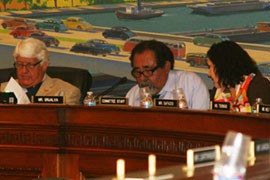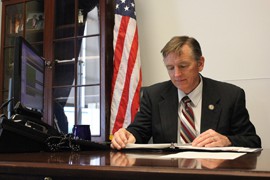Cronkite News has moved to a new home at cronkitenews.azpbs.org. Use this site to search archives from 2011 to May 2015. You can search the new site for current stories.
Gosar, Grijalva spar over bills to rein in president on national monuments
WASHINGTON – To Rep. Paul Gosar, R-Prescott, his bill to bar the president from establishing new national monuments in Arizona without congressional approval is simply about transparency.
“Right now, the president of the United States, with a stroke of a pen, can lock up millions of acres of land,” said Gosar.
To Rep. Raul Grijalva, D-Tucson, it’s a threat to a law that has helped preserve such treasures as the Grand Canyon and the Sonoran Desert.
“Maybe Teddy Roosevelt shouldn’t have made the Grand Canyon a national monument. Maybe Woodrow Wilson shouldn’t have created the National Park Service, either,” Grijalva said.
Their comments came Thursday as a House subcommittee considered two bills – including Gosar’s – that would amend the century-old Antiquities Act to rein in the president’s ability to proclaim national monuments on public land.
The act was created in 1906 and allows the president to protect historic, archaeological and other sites by declaring them federal monuments. More than 130 such sites have been designated since the act was signed, including five that have been named by President Barack Obama.
“For over 100 years, 16 presidents – both Republicans and Democrats – have used the Antiquities Act to protect America’s cultural and natural treasures,” said Alan Rowsome, a Wilderness Society official, in testimony prepared for the hearing of the House Natural Resources Subcommittee on Public Lands and Environment Regulation.
Gosar’s bill, cosponsored by the rest of the Republicans in the state’s delegation, would simply amend the Antiquities Act to prohibit designations in Arizona without “express authorization of Congress.”
A separate bill by Rep. Devin Nunes, R-Calif., would apply nationally and would require that national monument designations be submitted for congressional and public review within two years of a presidential proclamation.
Grijalva called the legislation “too broad,” pointing to the Arizona monuments that were created by presidential order. His comments were echoed by a National Park Service official.
“These two bills, which would limit the president’s authority in various ways, would undermine this vital authority,” said Cam Sholly, associate director of the service’s visitor and resource protection unit.
But Travis Brown, a spokesman for the Montana Stockgrowers Association and the National Cattlemen’s Beef Association, supported the limitations on presidential authority.
“It’s difficult for me to understand that we don’t have a process in place,” to let local residents weigh in on plans to designate lands for national monuments, he said.
Gosar said the declarations often get in the way of people using and enjoying the very resources the monuments are supposed to protect.
“Too often, we find that some federal land designations are causing endless bureaucratic delays, litigation and restrictions that completely block out much of the … stores of wealth and recreation opportunities,” on public lands, he said.
But Grijalva worried that limiting that authority could lead to loss of archaeological, historical, and tribal lands, and he urged more study of the issue.
“A national monument legislative action should get a full hearing where we can give due diligence,” Grijalva said.








